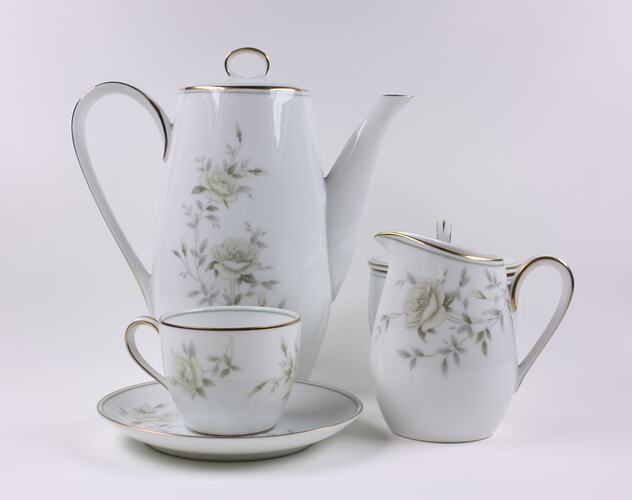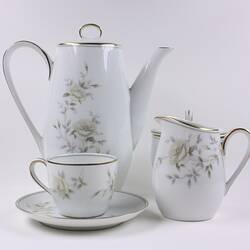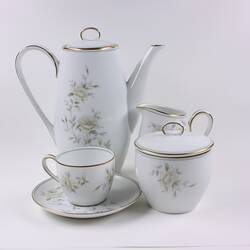Summary
Fifteen piece Noritake china coffee set, received by Dorothea Dunzinger in Melbourne as a wedding gift in 1960 soon after migrating from Austria in 1959. It is white china with a pale grey and yellow rose design and consists of six cups, saucers, a milk jug, sugar bowl and coffee pot.
Born in 1929 near Graz, Austria, Dorothea was a proficient recreational skier and part of a volunteer rescue team in Switzerland. She lived and worked primarily as a mill weaver and seamstress in England, Switzerland and Austria before migrating to Australia from Austria on 30 November 1959, arriving on the Cogedar Line ship 'Flaminia' on 31 December. She settled in Melbourne and married fellow Austrian Johann Dunzinger whom she met at Broadmeadows migrant hostel. They had a daughter Caroline and lived in various Melbourne suburbs boarding and renting before building a home in Kalorama. The couple divorced in 1978. Dorothea worked hard all her life, owning a boutique clothing shop in Camberwell at one stage but primarily as a textile outworker and factory worker trying to make ends meet. She died in 2001.
Physical Description
Fifteen piece Noritake china coffee set. It is white china with a pale grey and yellow rose design with gold edging. It consists of six cups, six saucers, a milk/cream jug, sugar bowl with lid and coffee pot with lid. Each piece has a hallmark, blue and gold with a central 'N'.
Significance
The Dunzinger Austrian Migrant Collection has evolved to become a rich group of objects which tell a particular story of an Austrian woman's post-war migration experiences, as well as broader contextual narratives relating to the variety of selection and management processes in place in Europe after World War II. These include references to Australian-specific organisations involved in migration management such as the Australian Migration Mission. Items explore the enthusiastic promotional activities of the Australian Government to encourage migration from the UK and Europe in order to populate Australia and build a workforce. Artefacts also relate to a significant Italian migrant ship of the period, the Cogedar Line 'Flotto Lauro'. There are also personal domestic items, clothing, needlecraft, and other personal items brought to Australia making this a well-rounded collection tracing a personal narrative from departure, journey, arrival and early settlement.
There is a also symbolic poignancy about the skis, ski clothing and rucksack, and the small sewing machine Dorothea Dunzinger brought with her from Austria. The skis represent precious mementoes from home and hopes and expectations for the leisure activity they might bring in Australia; the sewing machine a pragmatic object which came to dominate Dorothea's actual settled life of hard work both in the home and as an outworker with no leisure time at all.
More Information
-
Collecting Areas
-
Acquisition Information
Donation from Ms Caroline Dunzinger, 07 Nov 2012
-
Past Owner & User
Mrs Dorothea Dunzinger, Melbourne, Victoria, Australia, 1960s
-
Manufacturer
-
Inscriptions
On base of each piece: ''NORITAKE CHINA/JAPAN'
-
Classification
-
Category
-
Discipline
-
Type of item
-
Keywords
Austrian Immigration, Post War Migration, Food & Drink Consumption, Food & Drink Preparation, Coffee Pots, Chinaware


